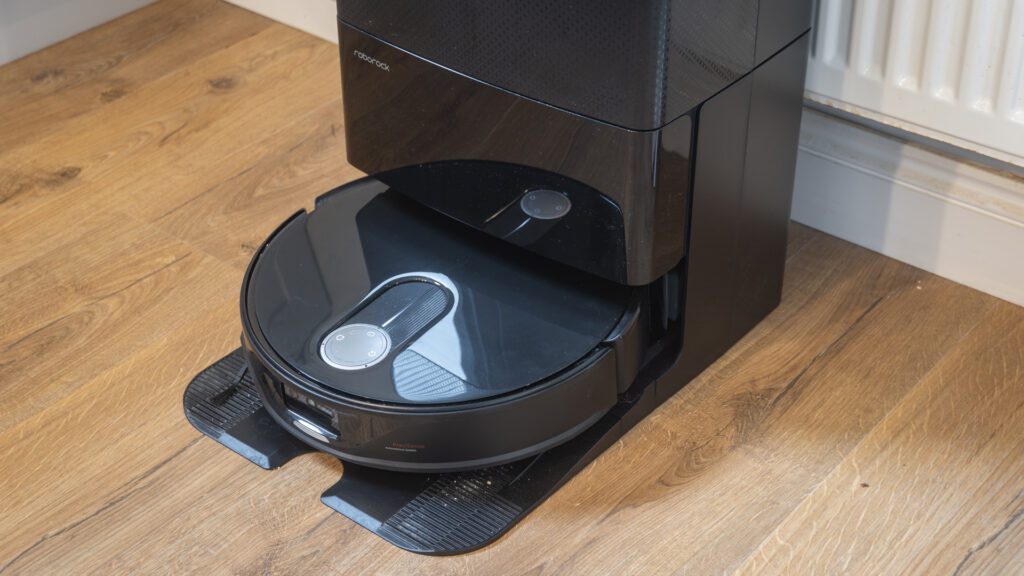Roborock Qrevo Slim: two-minute review
Although sporting a lower-profile design than some rivals, the Roborock Qrevo Slim is otherwise a full-size robotic vacuum and mop that is powerful, intelligent and packed with features. The redesigned LiDAR system means it can slide more easily under low furniture, getting to floorspace that other robots can’t, without any noticeable compromise in navigation performance.
The well-appointed Roborock app serves up no fewer than five suction levels, plus configurability for the cleaning route and mopping performance. It also smartly raises its dual spinning mops when carpet is detected, and features a spinning side brush that pivots outwards to reach into the corners of every room.
With up to 11,000Pa of suction power, the Qrevo Slim is more powerful than many rivals, including the pricier Eufy Omni S1 Pro, and you can even view a live stream from the front-facing camera in the Roborock app, turning the vacuum cleaner into a pet monitor.
The Slim does not feature the bouncy ‘AdaptiLift Chassis’ found on the Roborock Qrevo Curv, which launched alongside the Slim in September 2024. However, perhaps thanks to the improved navigation system, the Slim robot itself still tackles thick rugs and raised door thresholds with a confidence missing from most rivals. It’s also worth noting that despite the low profile, this is still a relatively large robot, with an equally large docking station, so it’s best-suited to medium and larger homes. That’s the short version; read on for my full Roborock Qrevo Slim review.
Roborock Qrevo Slim review: price & availability
- List price: $1,399
- Launched: September 2024
- Availability: US
The Qrevo Slim launched in September 2024 and sits in the premium price bracket. It comes with a list price of $1,399, but you might be able to avoid paying that – I’ve spotted it discounted to around $999. At time of writing (because this market moves fast!) it sits at the top of Roborock’s Qrevo range at, which itself occupies the middle tier of the company’s robotic vacuum offering.
Below it you’ll find the budget Q Series, and above you’ll find the flagship S Series family, where prices start just below the Qrevo Slim (you’ll pay $1,300 for the S7 Max Ultra), and extend all the way up to the range-topping, $1,800 S8 MaxV Ultra.
A four-figure vacuum may sound expensive, but that $1,300 buys you a lot of smart technology, and in this case your money goes into an interpretation of LiDAR known as ‘StarSight’, which is unique among robot vacuums, and is responsible for the Qrevo Slim’s reduced height. You also get very high suction power – and in fact, at 11,000Pa, the Slim is more powerful than even Roborock’s flagship S Series, which peaks at 10,000Pa. For comparison with other brands, the equally expensive Eufy Omni S1 Pro is rated at just 8,000Pa.
There is no ongoing subscription cost for the Qrevo Slim, although you’ll need to purchase replacement dust bags every couple of months (Roborock says they get full in about seven weeks), and the side brush and mopping pads will eventually need replacing too.
- Value for money score: 4 out of 5
Roborock Qrevo Slim specs
| Max suction: | 11,000Pa |
| Robot diameter: | 13.8 in / 35cm |
| Robot height: | 3.2 in / 8.2 cm |
| Dock dimensions (W x D x H): | 13.4 x 19.2 x 20.5 in / 34 x 48.7 x 52.1 cm |
| Dust bin volume (onboard): | 0.22L |
| Dust bin volume (base): | 3L |
| Water tank volume: | TBC |
| Base type: | Self-emptying dust bin, refill water tanks and mop washing/drying |
| Mop: | Dual rotating mop pads |
Roborock Qrevo Slim review: design
- Low-profile design fits under furniture
- Self-cleaning and emptying charge dock
- Dual rotating mop pads
The ‘slim’ part of this robot’s name refers to how it doesn’t have a spinning LiDAR sensor on top. This makes it shorter than most rivals, and at 8.2 cm tall it can drive places other robotic vacuums cannot. Roborock has replaced the conventional LiDAR sensor with a system it calls StarSight. This includes a dual-light, solid-state LiDAR system, plus a 3D time-of-flight sensor, a camera and infrared sensors. (Head to TechRadar’s article on how robot vacuums navigate for a deep-dive into this area.)
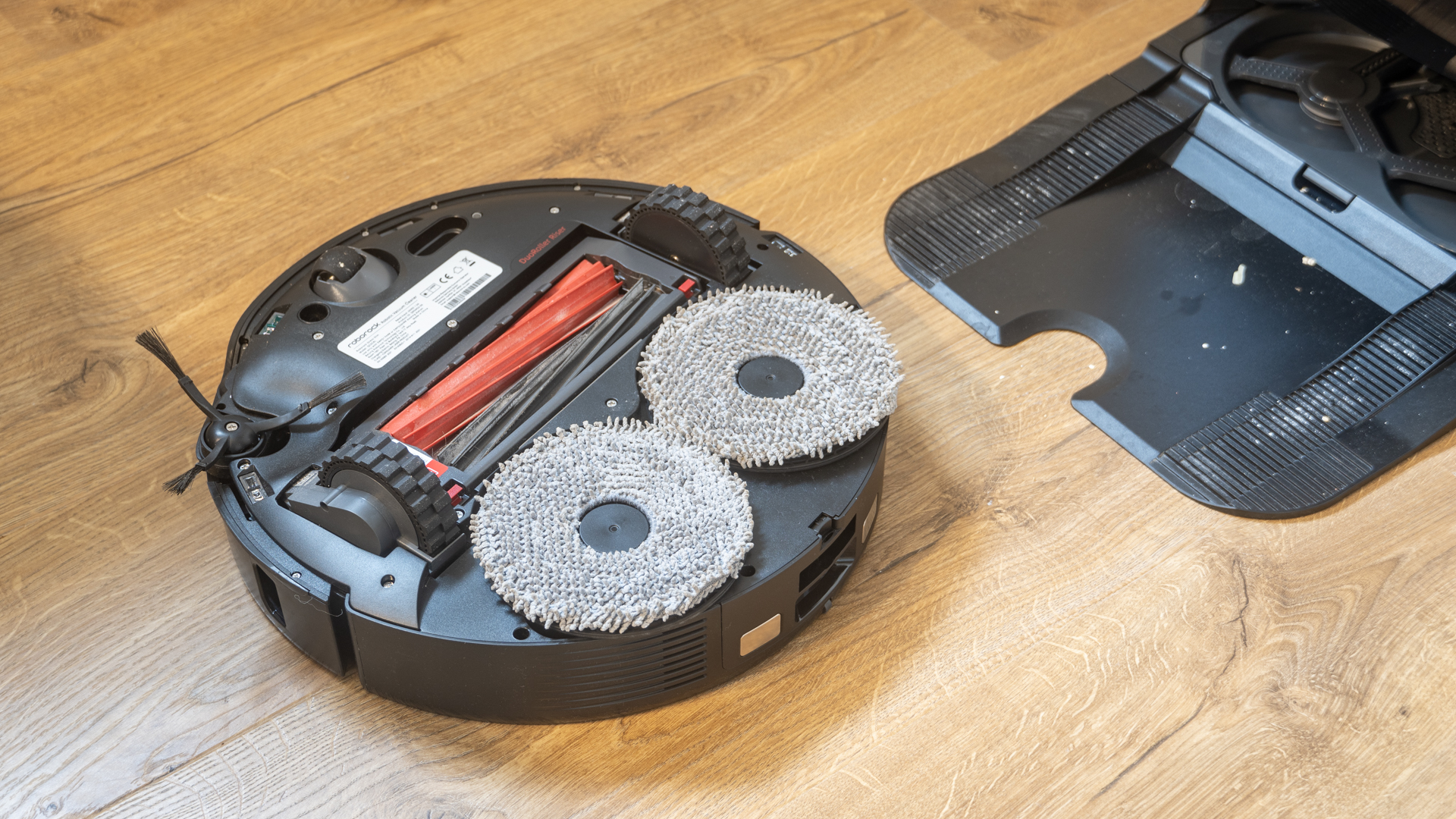
The rest of the Qrevo Slim’s design is similar to other self-cleaning robovacs in the Roborock range. The robot is circular, with dual spinning mops at the rear (this style of mop is typically better at scrubbing than the fixed, D-Shaped pad style), a rotating brush at the side that cleverly extends to reach into corners, and a pair of rotating rubber brushes underneath. The charge dock has a dust bin and a pair of water tanks – one clean and one dirty – to work with the robot’s mopping function.
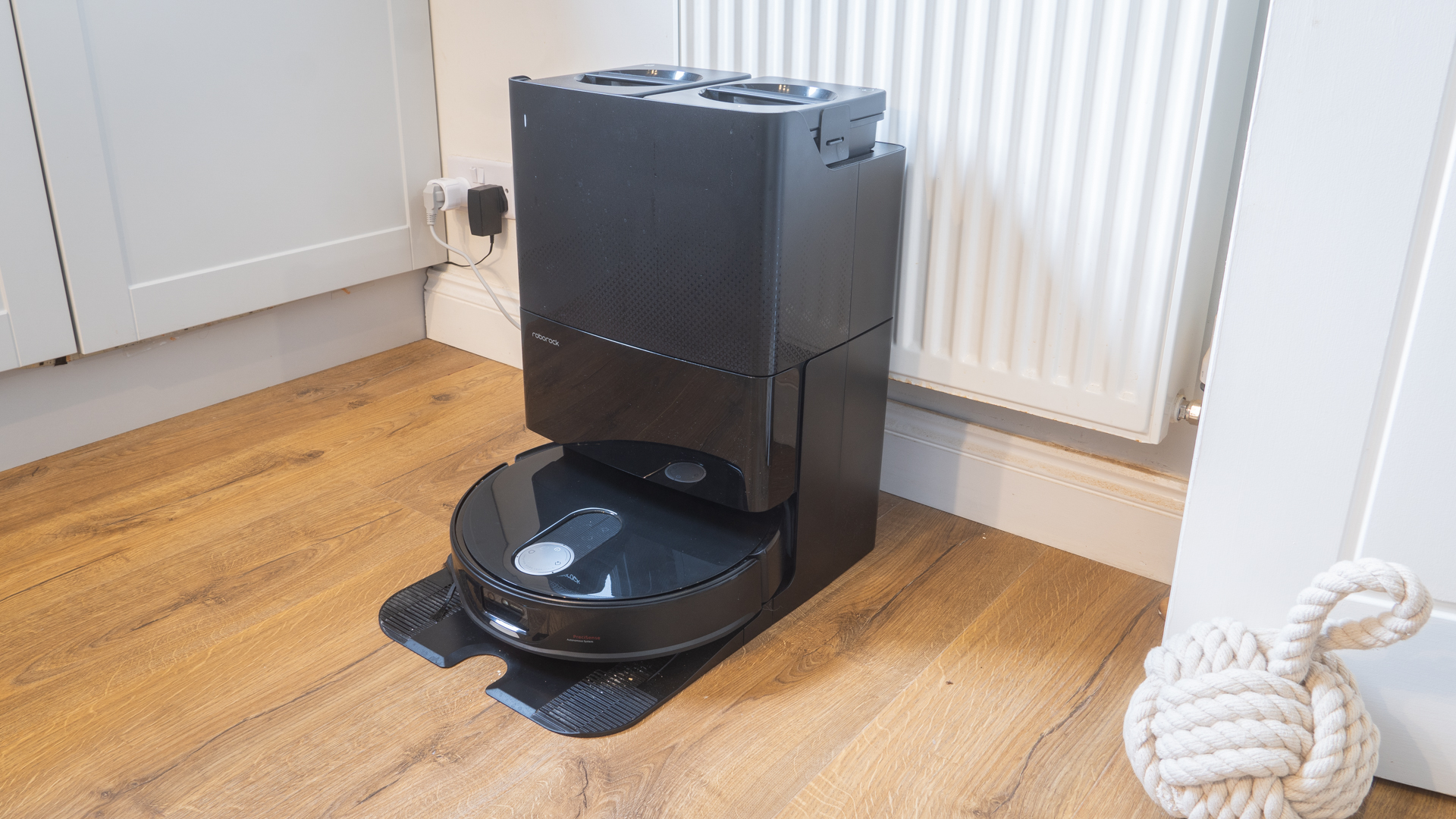
The robot itself measures 350mm (13.8in) wide, 353mm (13.9in) deep and 82mm (3.23in) tall, while the dock is 340mm (13.4in) wide, 487mm (19.2in) deep (including a ramp the robot parks on) and 521mm (20.5in) tall, although you’ll need to leave space for the water tanks, which are removed by lifting them upwards from the dock.
Roborock also sells the Qrevo Slim with a refill-and-drainage system. This works in the same way, but plumbs into your home’s water supply, so can refill and drain the mopping water tanks automatically. This dock is the same width and depth, but is shorter, at 405 mm (15.9in). For this review we’re looking at the regular model with the larger, manually-refilled and emptied water tanks.
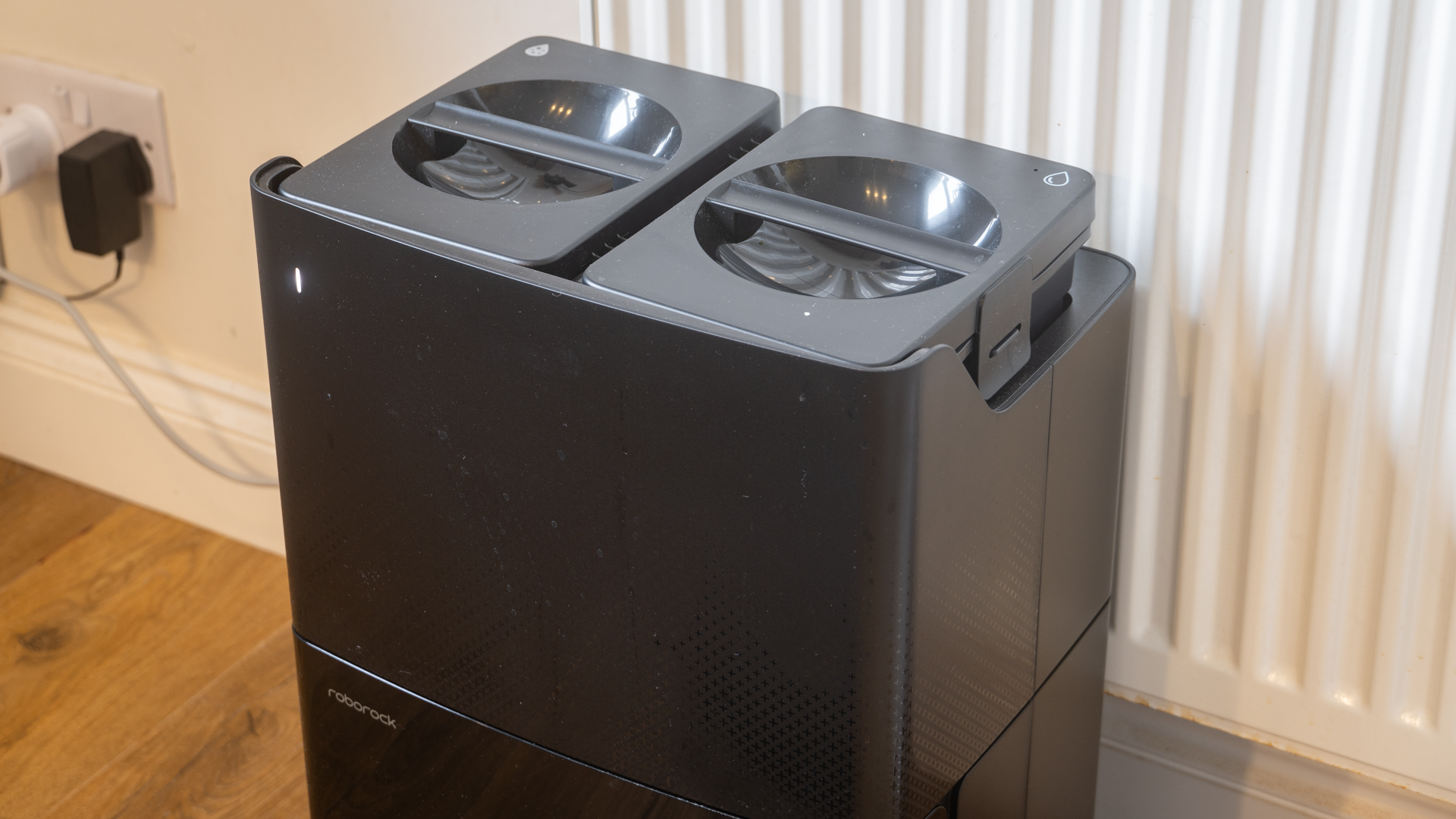
As with other such robots, the Qrevo Slim dock charges the robot’s battery and empties its dust bin into a larger bag that Roborock says only needs changing every seven weeks, although that will vary depending on what you’re asking it to pick up. The robot also has its mopping pads cleaned with warm water and dried during charging, while the onboard water tank is emptied into the dock.
Back to the robot itself, and the Qrevo Slim can automatically lift and lower its mops, depending on the floor surface and what cleaning task is required. The side brush and one of the spinning mops can also move outwards, touching the walls and skirting boards for a complete clean.
There are three buttons on the top of the robot for quick access to key functions, like powering up, pausing and sending it back to its dock. Removing the magnetic cover gives access to the dust bin and filter, which can then be removed and cleaned or replaced.
The robot and dock take up a fair bit of space, and it’s recommended that you place the dock against a wall, but with enough space either side for the robot to drive into, ensuring it cleans every last bit of your floor. You don’t have to do this though, and you can sit the dock in a corner if needed; just make sure the ramp is clear for the robot to drive onto.
- Design score: 4.5 out of 5
Roborock Qrevo Slim review: performance
- Handles thick rugs and raised thresholds with ease
- Automatic switching between vacuum and mop
- Cleans deeply and reliably
Right away, I want to highlight how good the Roborock Qrevo Slim is at driving through thick rugs and over raised doorway thresholds. These are both tasks other robotic vacuums can really struggle with, and even flagship models with four-figure price tags have failed to clamber their way from my exposed-floorboard hallway into the carpeted bedroom.
Not the Qrevo Slim though. It drove over every threshold, every time. It even managed to wade its way through a thick rug in the lounge – something no other robot has achieved reliably – during its first exploratory drive. During that drive it used its camera and imaging sensor to create a map of my flat, which it automatically split into labeled rooms. It got most of the labelling correct, but I still had to jump into the app and make a few edits before saving the map.
Its off-roading abilities meant I could leave the Qrevo Slim to get on with its job, safe in the knowledge that it would drive into every room, clear the rug (and automatically vacuum it, too) and return to base without me checking if it had got trapped. On a couple of occasions, it briefly got stuck on a raised threshold, but always managed to clear it by reversing and driving forward again at a higher speed.
The automatic mode selection also impressed me. Since it’s so often a challenge for robotic vacuums, I usually roll the rug up and set a robot to mop and vacuum the wooden floor. But with the Roborock I left it to do its own thing, where it vacuumed and mopped the wooden floor, then automatically raised its mop to vacuum the rug, before lowering it again to continue mopping the floor and ensuring the rug stayed dry.
As well as recognizing the difference between floor types, and where each room ends, the robot can also spot common household items like beds, sofa and television stands, which it then adds to the map.
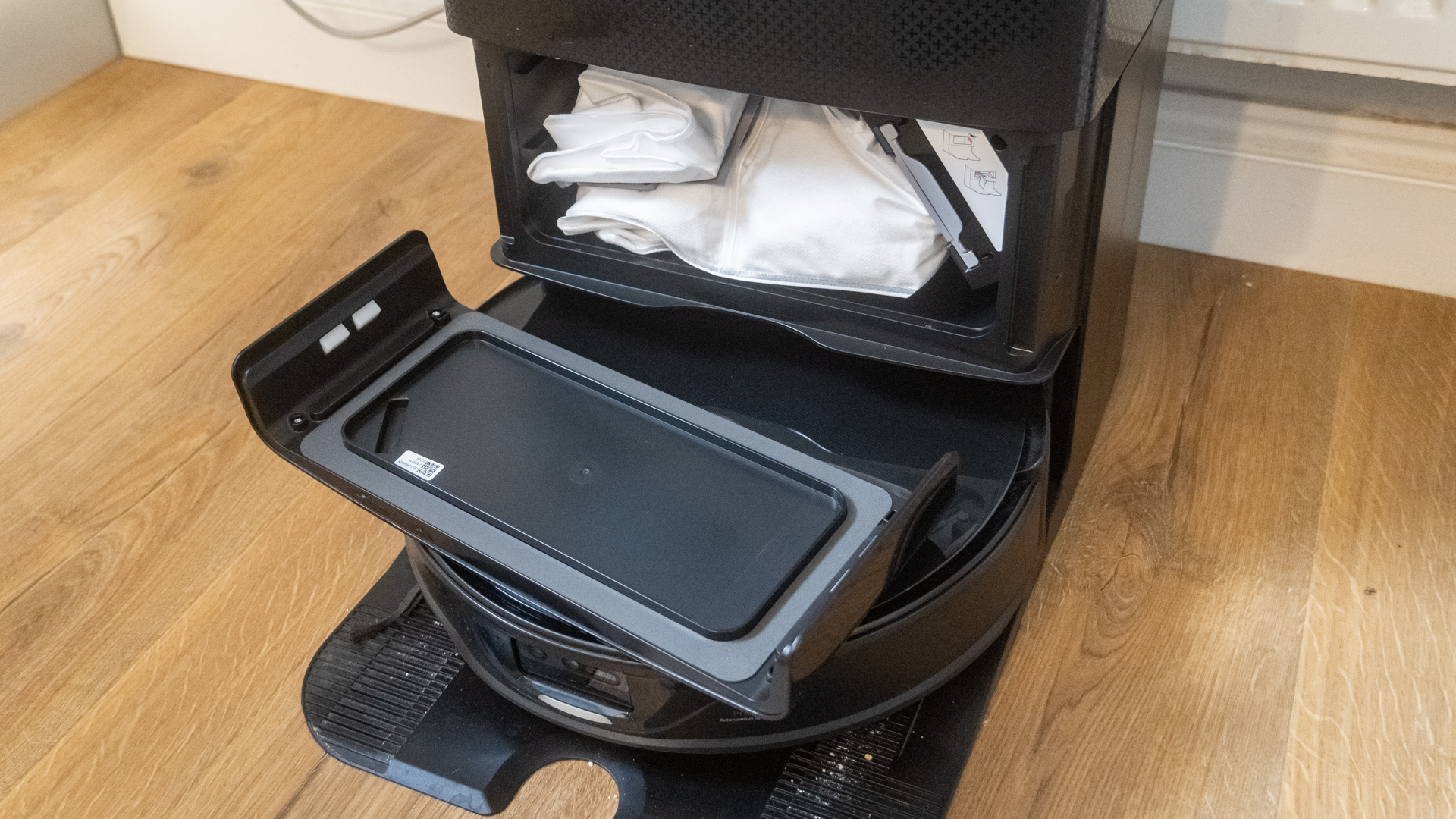
On test, the Qrevo Slim’s navigation was usually very good, driving confidently into small gaps, not crashing into anything at speed and not getting stuck. But on one occasion it got confused and failed to find its way back to the dock. Understandable if it was stuck under the sofa, or somewhere else far from the charging station, but it was just a foot or so from the dock, yet after lots of spinning around it declared defeat via an app notification. I don’t know what caused this, but it only happened once during several weeks of testing.
Onto the specific cleaning tests. I begin by scattering a mix of oats and flour across approximately one square meter of wooden kitchen floor. I began in the quietest, least powerful vacuuming mode, with the robot driving a standard pattern and completing the route only once.
At just 60 dB, Quiet mode really is very quiet indeed, with the vacuuming itself no louder than the motors driving the robot around. As expected, this mode didn’t do a particularly good job at picking up debris. It’s okay for dust (or flour in this case) but struggled with the oat mix. Just like most other robotic vacuums, the Qrevo Slim’s rotating side brush tends to flick debris around the room, and out of the robot’s path. Telling it to perform the route twice mostly fixes this, as the flicked debris will be collected on the second pass.
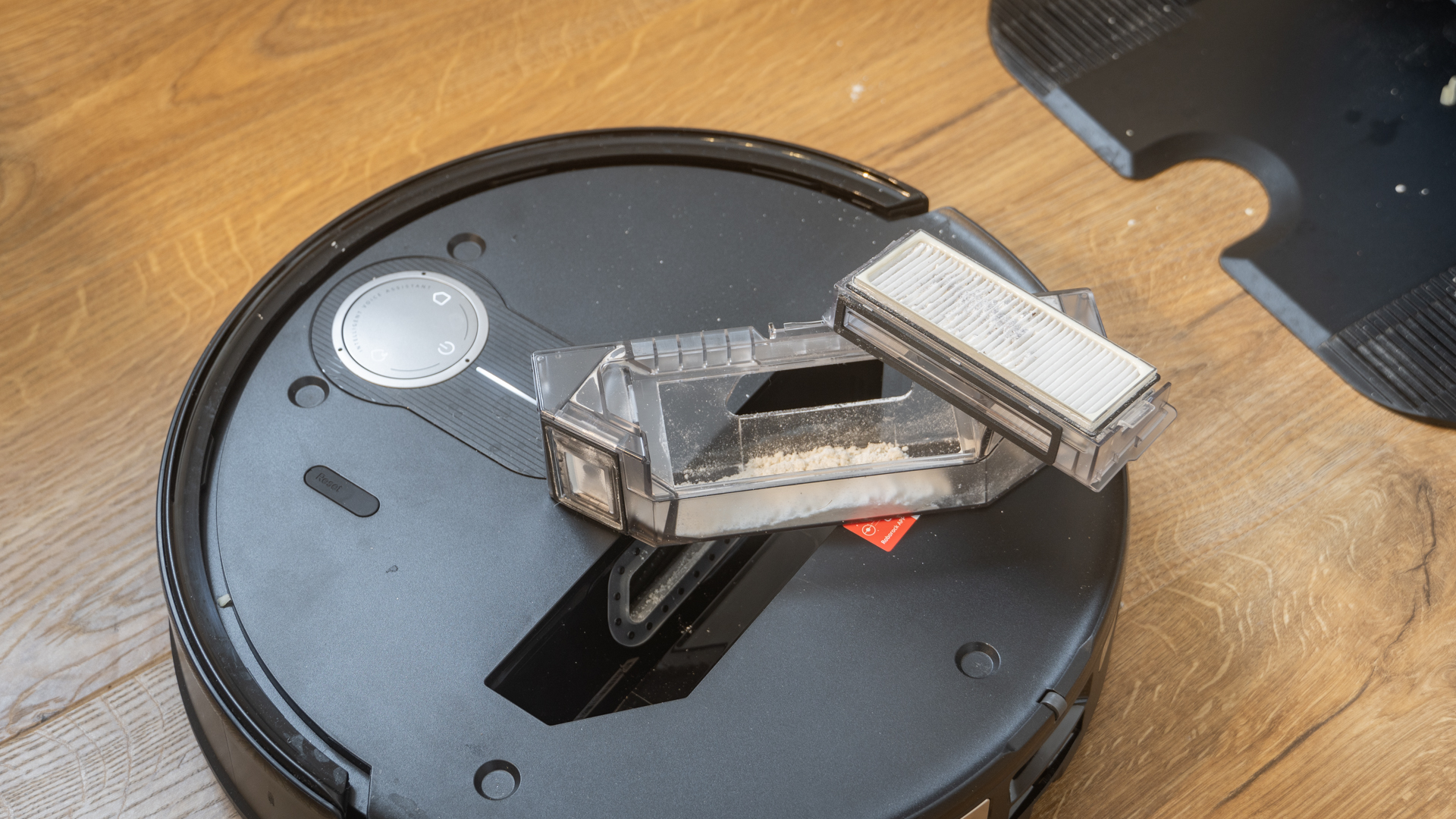
Turning the vacuum power up to Balanced (one level up from Quiet) and telling the robot to clean the same area twice made a big difference. Despite only being slightly louder (about 63 dB), this setting sucked up almost all of the oat mix, with just a few pieces flicked out of reach by the side brush. Turbo mode is the next step, but at 65 dB it’s only slightly louder than Balanced, but clearly has more power and was able to pick up all of the flour and almost every piece of oat.
Max vacuum strength is noticeably louder, at 69 dB. This is when the Qrevo Slim starts to really sound like a vacuum cleaner, but it’s still the sort of volume you can talk over with a slightly raised voice. The cleaning power is also ramped up, providing an excellent clean.
However, on this run I noticed how when you create a zone for the robot to vacuum, it won’t go right to the edges of a room, even if the zone you create overlaps the walls of the room map. This means you’ll be left with a line of debris – in this case flour – swept to within a few inches of the wall but not collected. This is despite me telling the robot to clean right up to the wall. It also frequently failed to clean up directly in front of its docking station. Telling it to clean the whole room fixed this.
Finally, it’s time for Max+, which even comes with a warning that it will shorten battery life due to being so power-intensive. This mode peaked at 70 dB and did a great job of collecting the debris, but the routing still meant some oats were flicked across the room and left behind; I also spotted how the robot drove over some flour without the vacuum on, then left a line of white tire tracks that it failed to pick up on subsequent passes. Requesting another clean, on a lower power setting, addressed this.
To summarize, cleaning whole rooms twice using Turbo or Max mode is best in most cases.
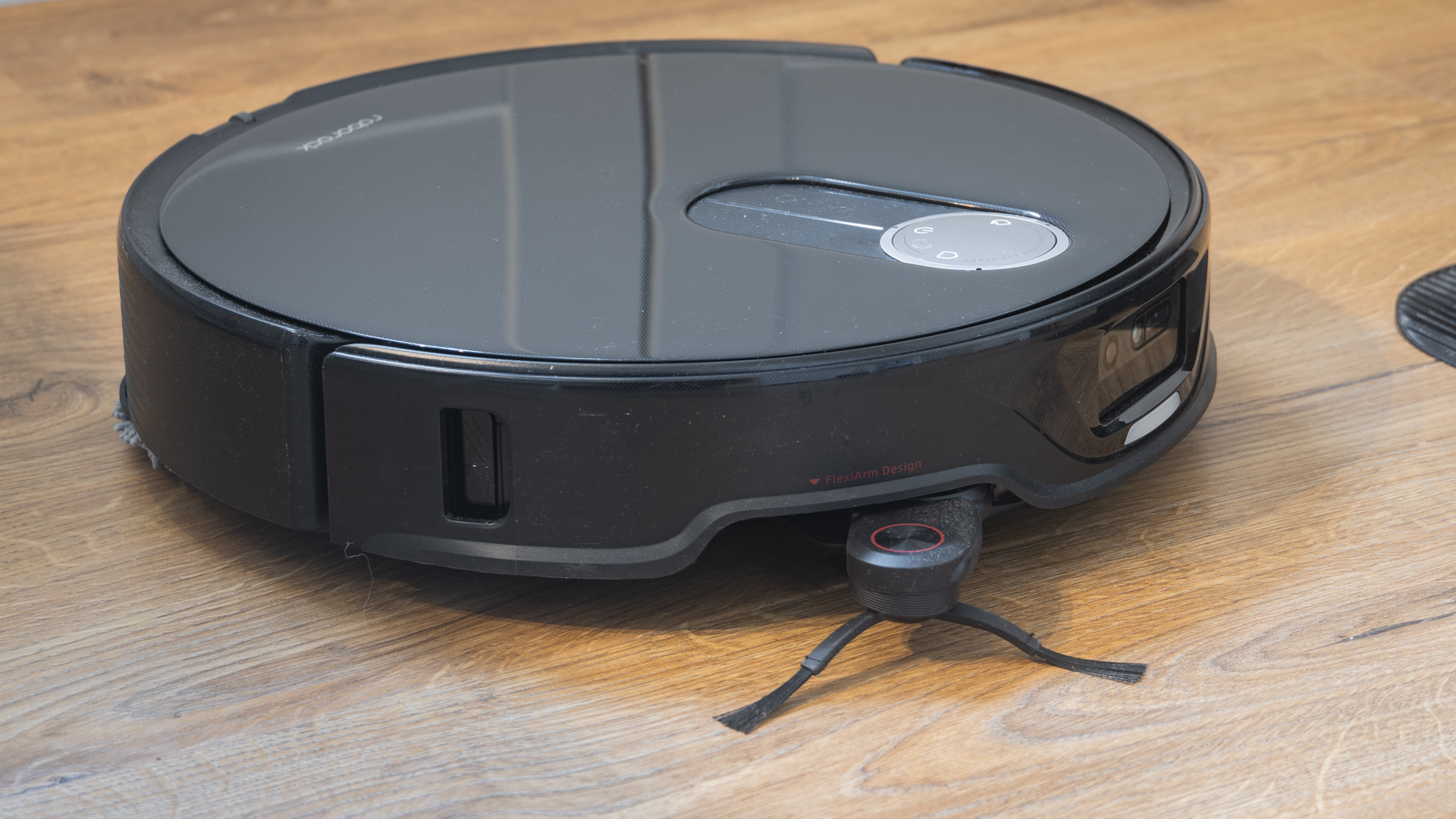
I then repeated these tests on carpet, and saw very similar results. The Quiet and Balanced modes are fine for a little-and-often approach, but failed to pick up all debris. Turbo and Max modes performed better, while Max+ feels like overkill for regular cleaning, but is still a nice-to-have. If I’d just moved into a new home, I’d be using the full 11,000 Pa of suction with Max+ in every room to start with, then switch to Routine or Turbo for scheduled cleaning.
Turbo mode is the best all-rounder, mixing an ability to suck flour out of a reasonably dense carpet, with a low volume level. I still wish the robot was better at collecting debris flicked around by the rotating brush, but this is only apparent when faced with very specific tests. You won’t notice this during regular cleaning, but might need to occasionally pick up a few bits of debris with a handheld vacuum.
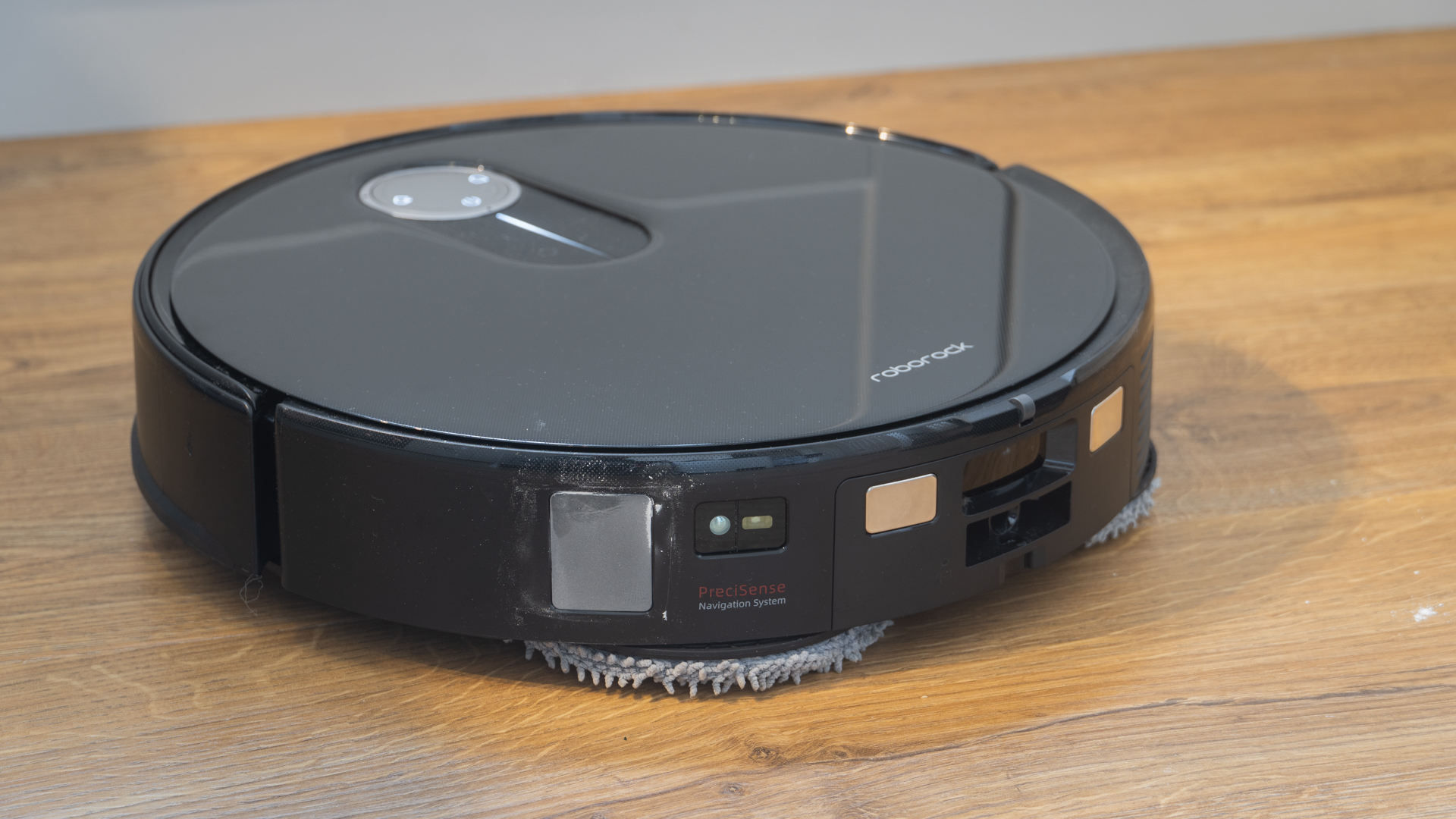
Finally, the mop. The Qrevo Slim has a pair of mops that spin at 200 rpm and push downwards for a deep clean. There are three preset water flow options (low, medium and high), plus a custom option where you can pick from a flow rate between one and 30. You can then tell the mop to clean an area once or twice, and pick from four route options, ranging from the quickest, through to Deep+, which is more thorough but takes much longer.
For my test I scattered some hot sauce across the wooden kitchen floor, left it to partially dry, then set the Roborock to work. I asked it to mop the entire room, using a moderate water flow (number 20 of 30), with two cleaning passes, and the Standard route option. In short, it did a great job. The right-hand rotating mop extends outwards, so that it can clean right up against the walls or skirting boards on an initial lap of the room, before tucking back into its default position and working together with the left-hand mop to give the entire floor a thorough wipe.
All of the hot sauce was removed, but only because I set the robot to make two passes; some stains were still visible after the first pass.
The side brush spins slowly during mopping, so it’s best to use the mop on a dried stain instead of a fresh spill, as any liquid will be wiped by the brush and require manual cleaning later. It’s also worth remembering that the mop uses only warm water and no detergent. (You can find premium robot vacuums that offer hot water mopping, although it’s rare – the option to add detergent is more common and is included on other Roborocks, including the S8 MaxV Ultra).
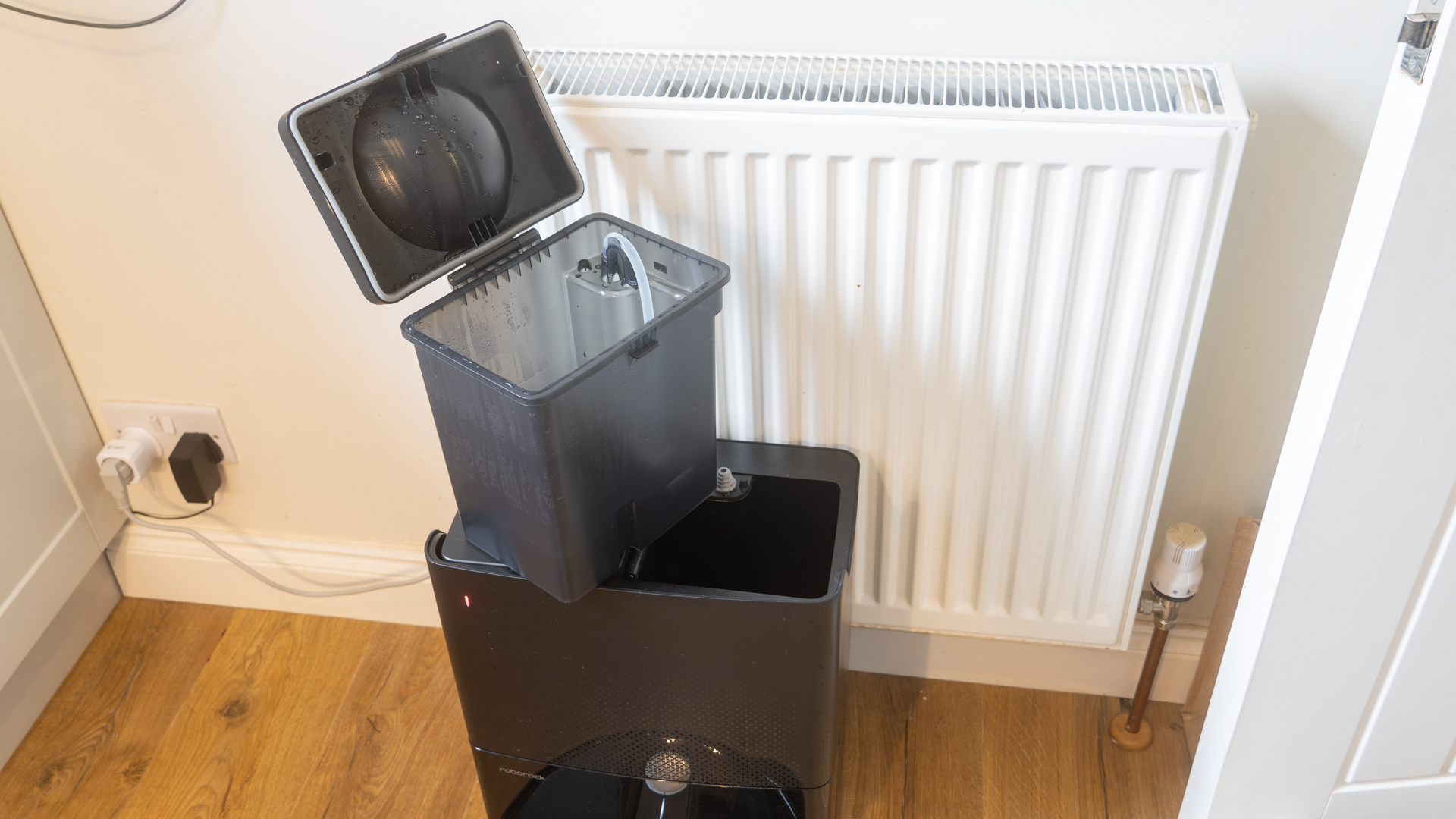
The mopping process is all very quiet, ranging from 44 bB to 58 dB as the water tank is filled from the docking station, then emptied again, and the mop is cleaned using hot water and dried with warm air. The mop takes three hours to fully dry, but during that time you can ask the robot to either mop again, or do some vacuuming. The dock base (the part the robot sits on while charging) self-cleans with a pair of rotating scrapers, but can also be removed for a manual scrub. After several weeks of testing, the base still appeared as-new.
There’s even a sensor in the charge station that checks how clean the robot’s water is, then cleans the mops more thoroughly if required.
Lastly, the robot has a voice control system that responds to the command ‘Hello Rocky’. It can be asked to ‘vacuum the bedroom’, ‘mop the kitchen’ or ‘dry the mop’, for example. The robot responds quickly and accurately, making voice commands a convenient way to access basic functions without finding your phone and diving into the app for more granular control.
The Qrevo Slim’s battery life is a claimed 180 minutes. This feels fairly accurate, but will vary considerably depending on which settings are used.
- Performance score: 4.5 out of 5
Roborock Qrevo Slim review: app
- Easy to use, but…
- Lots of customization on offer. Almost overkill
- SmartPlan and homescreen widgets are handy one-tap solutions
The Roborock app works like most other robotic vacuum controllers. There are several customizable cleaning parameters to adjust, including five levels of suction power, three levels of water flow for the mopping function, and the option to clean an area once or twice, plus an option to pick between the standard or faster, more efficient cleaning route. Or, it can be set to only vacuum or mop a certain room or area, depending on your needs.
There’s also the SmartPlan, which uses artificial intelligence to learn your cleaning habits and preferences, then creates a customized vacuuming and mopping plan.
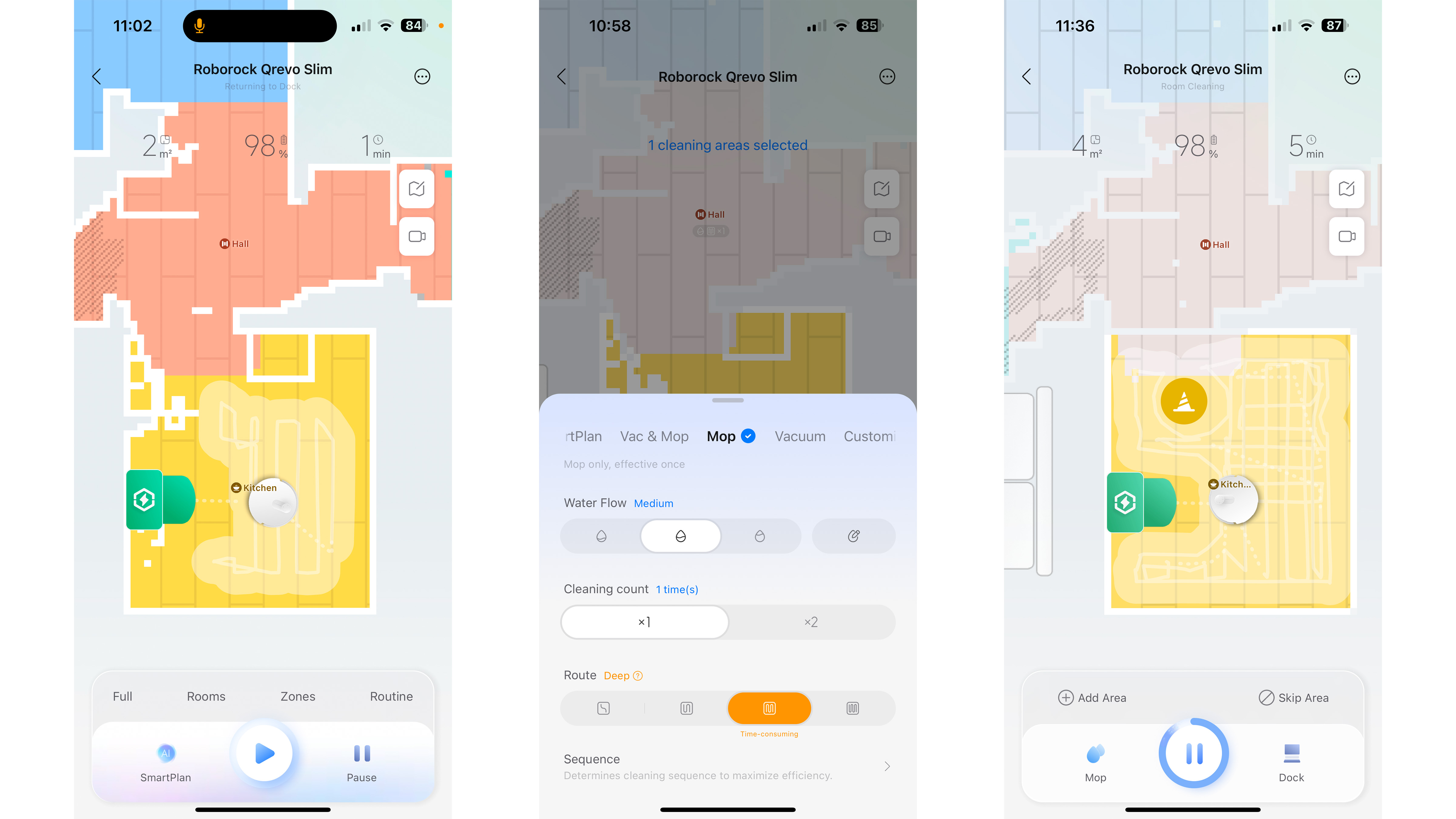
On top of all that are the routines. If you don’t want to clean the whole map, or a single room, you can instead select the After Meals routine, which can be configured to clean only the kitchen and dining room, for example. Routines appear on the home screen of the app, and can be activated with just one tap. iPhone users can create a homescreen widget with one-tap access to a couple of your most-used routines. With that set up, it’s a case of unlocking your phone and tapping once on the widget to start a cleaning routine.
There are even a few pet-friendly app features, including a function where the robot will go and look for your pet without the vacuum running, using its forward-facing camera to show a live stream of what’s going on.
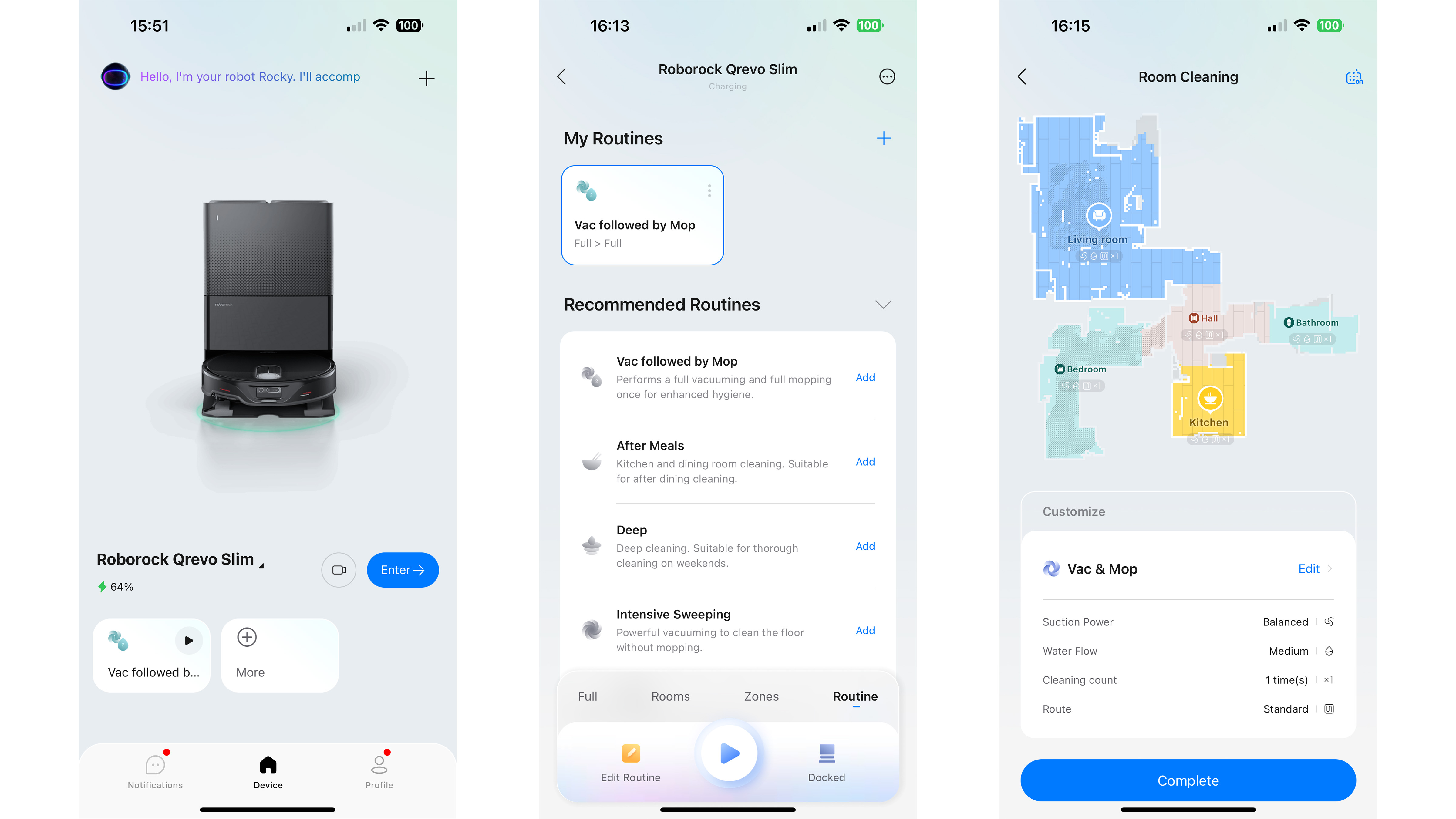
As with other robotic vacuum apps, there are options to reconfigure your map and rename rooms. There are also masses of settings to adjust, if you wish, from cleaning schedules, to how the robot uses its lifting mops, what temperature water it uses to clean the mops, how often it empties its dust bin, and much more.
These can almost all be left to their default setting, but I strongly urge pet owners to enable pet mode in the Reactive Obstacle Avoidance page of the settings menu, since this ensures the robot recognizes and avoids pets and their waste with extra precision.
- App score: 4.5 out of 5
Should you buy the Roborock Qrevo Slim?
| Attribute | Notes | Rating |
|---|---|---|
| Value | It certainly isn’t cheap, but the Qrevo Slim still offers good value, thanks to its strong suction, feature-packed app and impressive mopping. | 4.5/5 |
| Design | Shorter than most full-size robotic vacuums, it can drive under low furniture and clean areas others might miss. Otherwise, all is very similar to its rivals. | 4.5/5 |
| Performance | Strong suction and dual rotating mops provide a great clean. It also navigates well, tackles thick rugs better than most, and cleans itself thoroughly. | 4.5/5 |
| App | There are two sides here; one gives quick, one-tap access to a whole-home clean. The other reveals an app absolutely packed with features and configurable options. Powerful, but lots to get your head around. | 4.5/5 |
Buy it if…
Don’t buy it if…
How I tested the Roborock Qrevo Slim
I set up the Qrevo Slim and used it as my only vacuum cleaner for several weeks. After using it for general vacuuming and mopping duties, I performed a series of tests to appraise its cleaning abilities, as well as its noise levels and how well Roborock’s smartphone app works.
Read more about how we test robot vacuum cleaners
- First reviewed November 2024


